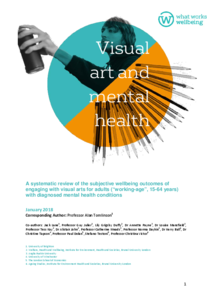
The importance of the visual arts in contributing to the wellbeing of adults with mental health conditions has been little documented beyond some insightful and influential interventions and exploratory studies. Initiatives such as Arts on Prescription projects have, in the UK provided examples of the positive effects that engagement in artistic and creative activity can have, and some of these have been documented in small-scale studies of interventions. Most of the evidence has been perceived as positive but of limited scale. In this context, this review was carried out to examine in a more focused way the ‘subjective wellbeing’ (SWB) outcomes of engagement with the visual arts for adults with a background history of mental health conditions. SWB embraces both the positive and negative feelings that arise in individuals based on their view of the world, how they think about themselves and others, and what they do in the interactions and practices of everyday life. Adult subjects in the studies included in this review were of ‘working-age’ (15-64 years). The focus of the review and the precise research question were agreed at inception sessions of the research team, and in collaborative engagement with stakeholders in the areas of policy, service-delivery, project and evaluation commissioning, and research and scholarship in the spheres of the visual arts and mental health.
Source: Summary
